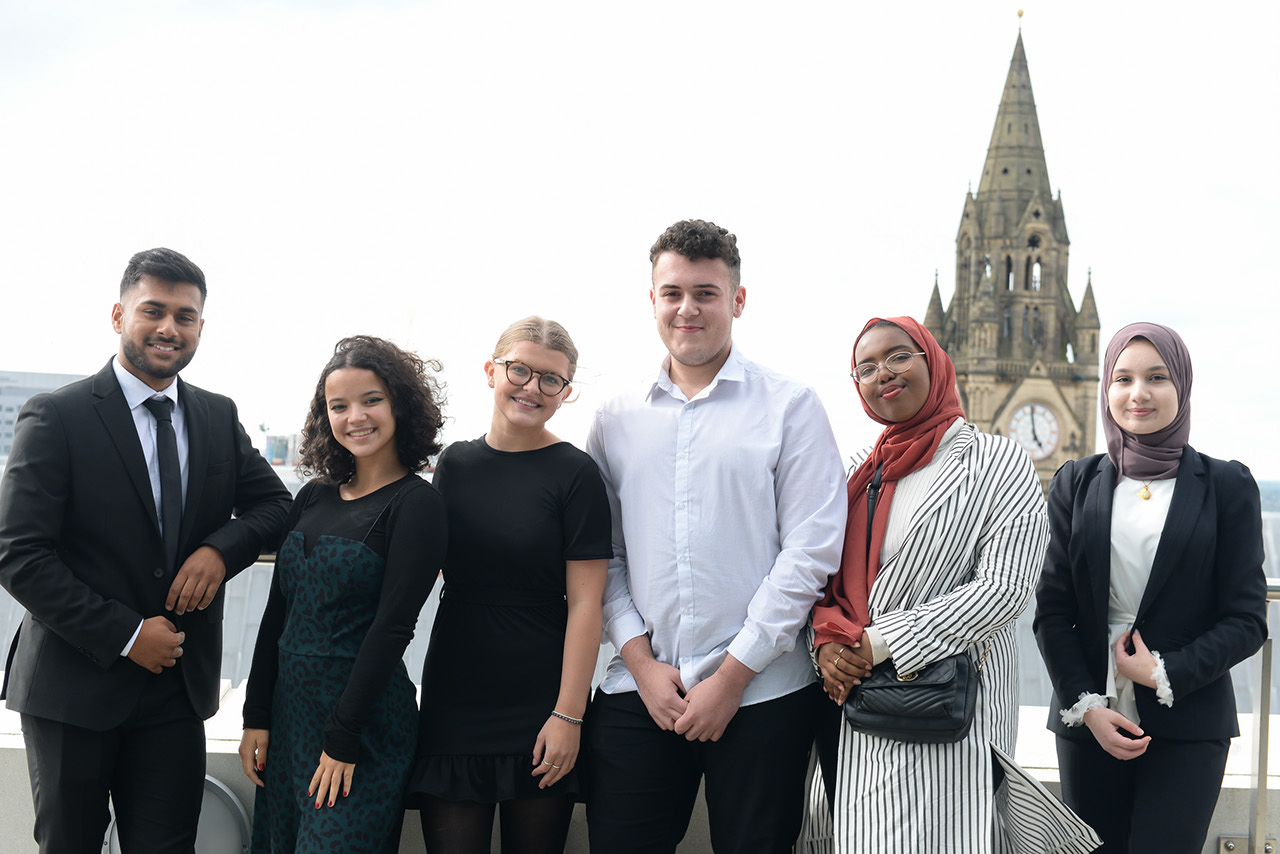The EY Foundation is a charitable company registered in England and Wales and Scotland with registered charity number 1157154 and SC045076. It is also a member firm of Ernst & Young Global Limited

By Natalie, Huma, Ife, Michelle and John, members of EY Foundation’s Youth Advisory Board (YAB)
Earlier this year, The Sutton Trust published their Opportunity Index report that highlights the uneven spread of opportunity across the country. The report is a powerful reminder of the inequalities that still shape young people’s lives in England. It ranks every parliamentary constituency based on six indicators: school attainment, A level results, post-16 progression, university completion by 22, earnings at 28, and sustained employment at 28 for pupils eligible for Free School Meals (FSM) - it reveals a stark divide. Here, five of us from EY Foundation’s Youth Advisory Board, share key findings from the report and our reflections as we consider our own experiences on the topic.
“FSM pupils are half as likely to be in the top 20% of earners at age 28, at 10% compared to 21% of non-FSM pupils.” It is crucial that this gap is bridged, especially in location cold spot areas, such as in the North West and North East of England. There are areas which are more challenging for young people to seek employment opportunities, due to a lack of investment in the local area. I grew up in the North West of England, in a small town in between Blackpool and Preston and found it hard to find high-paying employment, even after finishing university. To secure employment after university, I moved country to Scotland, which is often an unspoken challenge for young people from lower socio-economic backgrounds. We need to encourage organisations to not only create more job opportunities but also to make them more accessible and equitable to young people from FSM backgrounds in these local cold spots.
It is also crucial that young people in areas such as the North East are taught valuable career skills from a young age to be able to access more job opportunities. Furthermore, there are often unwritten rules in the professional workplace, which are more challenging for young people from lower socio-economic backgrounds to pick up on, due to lack of exposure and role models. One way in which we can drive the skills agenda is through pre-employability programmes, like EYF’s Smart Futures programmes, running in Newcastle.
Only 1 in 10 young people from FSM-backgrounds make it into the top 20% of earners by age 28, compared to 1 in 5 of their peers from more advantaged circumstances. This statistic stood out to me because it reflects a harsh reality: talent alone is not enough without access, support, and representation. Coming from a working-class background, from Manchester, I have felt the pressure of having to prove myself in spaces that were not built for people like me. Cultural expectations, financial limitations, and a lack of networks can all create invisible barriers.
As a Muslim woman pursuing a career in technology, I have often been the only person in the room who looks like me, wears a headscarf, or comes from my background. It can be isolating. I have had to challenge assumptions and stereotypes before even being given the chance to show what I can do. From limited access to resources growing up, to navigating university and professional environments where few people share my lived experience, I have seen how uneven the playing field can be.
This statistic is not just data. It is personal. It is a call to action across education, employment, and policy to create systems where every young person, regardless of background, has a fair and equal chance to thrive. Social mobility should not depend solely on individual resilience. We need meaningful structural change to open opportunity and ensure no one is left behind.
“42 of the top constituencies for opportunity in the country are in London, with just eight of the top 50 located outside the capital. In stark contrast, the lowest-ranked constituencies are heavily concentrated in the North East, North West, and parts of the South East.”
These statistics really struck a chord with me. They forced me to reconsider what it means to come from a ‘privileged background’, simply because I grew up in London. It is only as I have gotten older that I have come to truly grasp how deep the regional divides run. Opportunities that were accessible to me growing up in London were not always available to friends living in the North of England. That realisation came as I matured and became more educated.
That said, being in London did not mean opportunities were handed to me on a plate. I often had to dig deep, searching online for programmes, internships, and schemes. But what I have come to understand is that even when opportunities exist in abundance, they are not always distributed fairly within cities themselves.
I am a passionate youth advocate because I am the product of people who invested in me — mentors who pointed me towards initiatives like the EY Foundation. But not every young person has someone doing that for them. That is why I continue to push for greater investment in career programmes, tutoring support, and university access schemes. Not just in London, but across regions and towns where social mobility is low. I believe young people should not just be passive recipients of these initiatives. They must be actively involved in shaping them.
The Opportunity Index challenges the myth that young people from low-income backgrounds are less ambitious or less capable. What it reveals is that opportunity itself is unevenly distributed. But we do not just see this as an injustice — we see it as a call to action. With young people at the centre of the conversation, this Index can be more than just a measurement tool. It can become a map for lasting change.
The Sutton Trust’s Opportunity Index highlights that all of the top 20 constituencies for opportunity in England are in London. This may seem like something to celebrate, however growing up in London I have seen various different realities, one filled with inequality and barriers, even within the same postcode. Although I live in a city full of resources and opportunities, there has still at times been a gap between my friends.
While one friend may be discussing their weekend coding class or university visit, another is navigating the educational system primarily alone due to their parents' limited English proficiency or unfamiliarity with UCAS.
What is unfortunate is that despite many opportunitiesbeing in London, it often does not reach the young people who need it most. While some schools struggle, others have excellent support networks. Depending on our upbringing, housing status, or even whether our parents comprehend the educational system, our futures can look very different even in the same classroom.
In order to guarantee that every school, family, and young person has an equal opportunity, I would like to see significant investment made in borough-level opportunity equality.
The percentage of pupils in Newcastle upon Tyne Central and Wast (North East) that are in sustained education or employment by after KS4, is 38% compared to the highest ranked area of East Ham (London) on 83%. I found this statistic to be staggering because it shows just how much of an effect where you grow up can have on your prospects after KS4.
Having grown up in Hull, it certainly wasn’t easy to find professional work experience opportunities in my local area to upskill myself, so this disparity between big cities like London; and ones in the North like Hull and Newcastle, was definitely something I experienced. Furthermore, travelling to London or one of the big cities to take advantage of these upskilling opportunities can be a difficulty for many FSM students, exacerbating the inequality and barriers to career growth that they already face. Being mindful of this, I think it is crucial that we take these stats as a call to action to secure FSM Young People’s futures.
Uncontrollable factors like postcode should never discourage today’s talented young people from pursuing their ambitions and leading the charge on systemic change through youth voice.
I hope that these stats serve as a reminder to organisations and young people alike that the job is not yet done!
Here’s what I think needs to be done to fix this:
- Increased access to upskilling opportunities for FSM young people in these regions outside of big cities.
- Increased guidance on the use of AI tools and on which skills we should be building for an increasingly AI-focused workplace. EYF and Microsoft recently launched their AI Skills Passport which helps tackle this problem, and the credentialisation of said skills.
- Use of digital innovations to mitigate the inherent inequality that comes with one’s location; Smart Futures and virtual programmes hosted via platforms like Teams have been great at addressing this.
Conclusion
If we truly want to close the opportunity gap, it starts with awareness. If you are passionate about supporting young people from low-income backgrounds, then we need to include the voices of those most affected - young people themselves.
We need…
👉 Equity of accessible employment opportunities across all areas in the UK, including at borough levels within cities
👉 Systemic changes to support young people from different backgrounds through further education and into employment
👉 Equitable opportunities to upskill
👉 To use AI and digital innovations to support accessibility and increased opportunities
Together, we should strive to build a future where every young person, regardless of background or region, has the opportunity to thrive.







